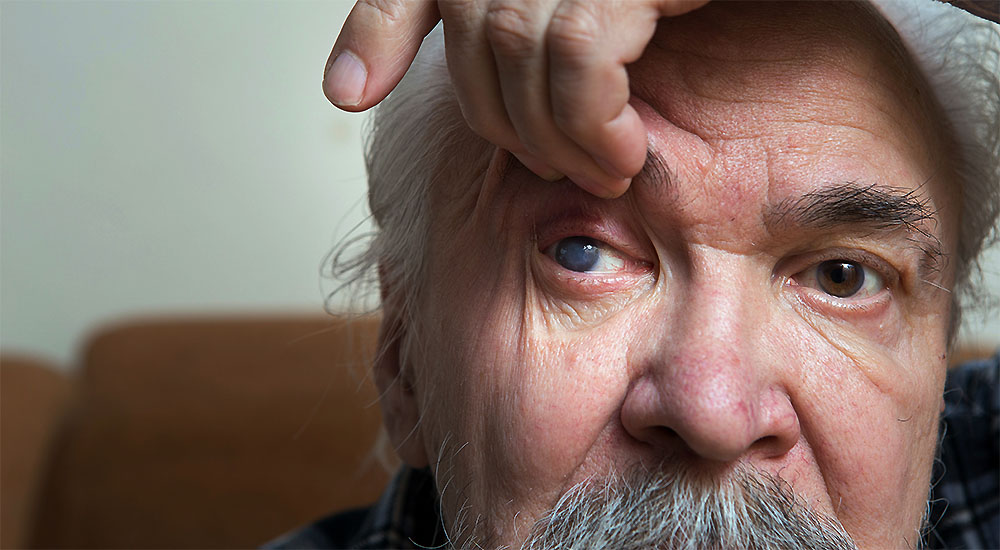Can Gluten Cause Glaucoma and Blindness?

Drugs and Gluten can Affect Eye Health

For a little primer on glaucoma – it is a slowly progressing disease that damages the eye’s optic nerve and can cause blindness. Open-angle glaucoma is the name given to the most common form of the disease that affects about 3 million Americans. Glaucoma is the leading cause of blindness for African Americans. Due to its slow progression and a lack of early warning symptoms, most who suffer don’t even know they have it.
While early diagnosis and treatment are key to prevent blindness, there is no cure, no known cause as to why the fluid builds up in the vessels in the eye causing damage to the nerve. What struck me, however, beyond the discussion of drugs affecting the eyes, was when he used the term ‘hypoperfusion’, which simply means inadequate circulation. The reason it resonated with me is that gluten is known to cause hypoperfusion of the brain. This fact has been related to the cause of depression, autism, and ADHD symptoms, to name a few, in affected individuals.
I asked my optometrist if there would be an association between a substance causing hypoperfusion in the brain also affects the vessels in the eye. He stated absolutely, that anything affecting the brain in that way would concurrently affect the vessels of the eye. Plus considering how small and delicate the vessels in the eye are, it wouldn’t take much to create a negative effect upon them.
Who’s at Risk for Glaucoma?
I pondered if gluten intolerance could indeed be a causative factor in glaucoma. With just a little research I found some information from the University of Maryland regarding who was most at risk for developing glaucoma:
- Over 60 years of age
- Family history
- African American descent
- Diabetes
- Myopia (nearsightedness)
- Taking certain drugs, such as antihistamines or blood pressure medications
- Food sensitivities
- Stress
- Sedentary lifestyle
- Hypothyroidism
Did you notice ‘food sensitivities’? Not only is it mentioned as a risk factor, but under ‘nutritional tips’ for glaucoma, they mentioned eliminating foods that one is allergic/sensitive to, including dairy and gluten.
Our ‘Favorite’, Fruits and Veggies are Good for Your Eyes
The University also stressed increasing your fruits and vegetables, as a diet higher in antioxidants is known to reduce one’s risk of developing glaucoma. Basically, everything I recommend as a clinical nutritionist for a healthy diet was echoed by the University of Maryland Complementary Medicine’s department.
E.g. lots of water, moderate exercise, reduced caffeine, include good fats such as fish oil and olive oil, and a small amount of lean, clean protein.
They also mentioned the importance of supplementing one’s diet with a great anti-oxidant formula. I don’t like to typically discuss products that we sell at the clinic, but I’m going to make an exception this time. Why? Because I think it’s important to share the data I learned from the formulator of my favorite multiple and anti-oxidant -a brilliant biochemist.
Supplements are likely Necessary
First of all, she said that it’s impossible to fit ‘everything’ in one pill. Her multiple (called Optimum Daily Allowance) is a large tablet and to get the required dosage requires 6 per day. (Yes, I know, I too wish it was less to swallow.) Plus, the antioxidant formula is separate because she says that to truly absorb the nutrients, it must be. Now this second one is a capsule and you only need 4 per day, but its name is ‘Body and Vision’. The name is apt because contained in it are many of the nutrients that are known ‘food’ for the eyes – lutein, alpha-lipoic acid, coenzyme Q10, etc.
Gluten Can Definitely Play a Role in Eye Health
Is avoiding gluten a good idea to prevent glaucoma? If you’re sensitive to it, absolutely. And, if glaucoma or any neurological condition runs in your family, it would be an excellent idea to get comprehensively tested for gluten intolerance – celiac and gluten sensitivity both.
On a personal note, my mother is now 90 years old. She’s very gluten sensitive but we only found out in her early 70s – this is when I first learned of gluten sensitivity. She was very ‘addicted’ to gluten and while she decreased her intake, it truly wasn’t until I moved her to live close to me that she became completely gluten-free, and that was about 6 years ago. She has glaucoma, she also has macular degeneration. And sadly, she has really begun to show brain atrophy. I
know you can say that living to 90 (with absolutely no diseases beyond those mentioned or medications, I might add) is pretty darn good. But watching her search for words and have her memory fail her is difficult. I know that it’s frustrating for her as well.
Could implement a gluten-free diet earlier in her life have prevented some of these brain and eye disorders? Hard to know and impossible to prove. But it does cause one to wonder. We do know that gluten can very much affect circulation into the brain. That in itself is good enough reason for everyone wondering about gluten to get thoroughly evaluated. Would you like to know if gluten intolerance is affecting your health?
Do you need help with your health?
We have the diagnostic and testing tools, the clinical experience, and a different medical approach to discovering the root cause of why you have the symptoms that are bothering you. As long as you are ready to make some dietary and lifestyle changes, we can help you. We will "hold your hand" through the changes, step by step, to make each step an easy one. We are located in Clearwater, FL, at 1000 S Ft Harrison, at the corner of Ft. Harrison Ave. and Magnolia St. There is plenty of parking space directly accessible from Ft Harrison. If it is not convenient for you to come to Root Cause Medical Clinic, we offer telehealth/telemedicine consultations to residents of certain states. Call us for details.
Contact us for a Consultation – Call 727-335-0400

Dr. Vikki Petersen DC. CCN
Founder of Root Cause Medical Clinic
Certified Functional Medicine Practitioner
Dr Vikki Petersen is a public speaker, author of two books, several eBooks and creates cutting edge content for her YouTube community. Dr Vikki is committed to bringing Root Cause Medicine and its unique approach to restoring health naturally to the world.
Ask a Doctor
Have a health concern you'd like to speak with a doctor about? Or just want clarity on a subject? Ask Us!


